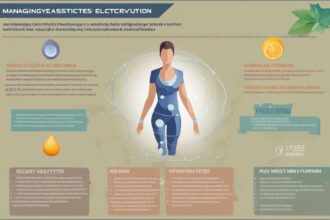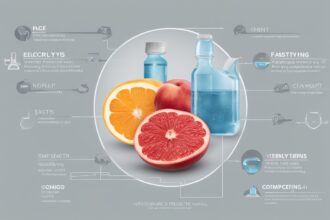Hey there, fasting enthusiasts! If you’re diving into intermittent fasting, extended fasts, or any fasting regimen, you’ve probably heard about the importance of electrolytes. But what exactly are they, and why do they matter so much when you’re abstaining from food? In this post, we’re breaking down everything you need to know about electrolytes for fasting. From understanding their role in your body to actionable electrolyte tips that keep you feeling energized and balanced, we’ve got you covered. Whether you’re a newbie or a seasoned faster, these insights will help you avoid common pitfalls like fatigue and cramps. Let’s dive into the science and practical advice to make your fasting journey smoother and healthier!
What Are Electrolytes and Why Do They Matter During Fasting?
Electrolytes are minerals in your body that carry an electric charge and play a critical role in maintaining fluid balance, nerve function, and muscle activity. The key players include sodium, potassium, magnesium, and calcium. When you’re fasting, your body isn’t getting these minerals from food, and water alone won’t cut it. Without proper electrolyte balance, you might experience symptoms like headaches, dizziness, or muscle cramps—common complaints during fasting. Understanding how to manage electrolytes is one of the best electrolyte tips for staying on track. During fasting, your insulin levels drop, causing your kidneys to excrete more sodium and water, which can throw off your electrolyte levels. Keeping them in check is essential for sustaining energy and avoiding the dreaded “fasting fog.”
The Science Behind Electrolytes and Fasting
Let’s get a bit nerdy for a moment. When you fast, your body shifts into a state of ketosis (if you’re doing a longer fast), where it burns fat for fuel. This metabolic switch impacts how your body handles electrolytes. Sodium, for instance, is lost through urine at a higher rate due to lower insulin levels. Potassium and magnesium can also deplete as your body adjusts to fasting. Studies suggest that inadequate electrolyte intake during fasting can lead to imbalances, affecting everything from your heart rhythm to muscle function. That’s why one of the top electrolyte tips for fasting is to be proactive about replenishing these minerals, even without food. Science shows that maintaining proper hydration with electrolytes can significantly reduce fasting-related side effects, helping you feel your best.
Common Signs of Electrolyte Imbalance During Fasting
Ever felt sluggish or foggy a few days into a fast? That could be an electrolyte imbalance waving a red flag. Recognizing the signs early can save you from unnecessary discomfort. Here are some common symptoms to watch out for while fasting:
- Fatigue: Feeling unusually tired or weak, even if you’re resting.
- Muscle Cramps: Painful spasms, often in your legs, due to low potassium or magnesium.
- Headaches: A sign of dehydration or sodium imbalance.
- Dizziness: Feeling lightheaded, especially when standing up quickly.
- Irritability: Mood swings or brain fog from disrupted nerve signals.
If you notice these, don’t panic. These are often fixable with simple electrolyte tips and adjustments to your fasting routine, which we’ll cover next.
Top Electrolyte Tips to Stay Balanced While Fasting
Now that we’ve covered the “why,” let’s talk about the “how.” Maintaining electrolyte balance during fasting doesn’t have to be complicated. With a few practical strategies, you can keep your body humming along smoothly. Here are some of my favorite electrolyte tips for fasting success that are easy to implement:
- Add a Pinch of Salt to Your Water: Use high-quality sea salt or Himalayan pink salt (about ¼ teaspoon per liter) to replenish sodium. It’s a simple way to boost hydration.
- Sip on Bone Broth: If your fast allows for it, bone broth is a fantastic source of sodium and other minerals. It’s like a warm hug for your body.
- Consider Electrolyte Supplements: Look for sugar-free powders or tablets with a balance of sodium, potassium, and magnesium. Check labels to avoid artificial additives.
- Don’t Overdo Plain Water: Drinking too much water without electrolytes can dilute your mineral levels. Balance is key.
These electrolyte tips are game-changers, especially for longer fasts. Start small and adjust based on how your body feels—everyone’s needs are a bit different.
Timing Your Electrolyte Intake for Maximum Benefit
Timing matters when it comes to electrolytes during fasting. You don’t want to chug a salty drink right before bed and wake up bloated or thirsty. A smart approach is to spread out your intake throughout the day. For instance, add a pinch of salt to your morning water to kickstart hydration after sleep. If you’re doing intermittent fasting, consider taking an electrolyte supplement during your fasting window to curb hunger and fatigue. For extended fasts, sipping on an electrolyte drink in the afternoon can help combat the energy slump. One of the best electrolyte tips for beginners is to listen to your body—if you feel off, don’t wait to replenish. Consistency and timing can make all the difference in how you feel during your fast.
Debunking Myths About Electrolytes and Fasting
There’s a lot of misinformation floating around about electrolytes and fasting, so let’s clear the air. Some people think you don’t need electrolytes if you’re only fasting for 16 hours. Not true—even shorter fasts can deplete sodium if you’re active or sweating. Another myth is that sports drinks are the best solution. Most are loaded with sugar, which can break your fast or spike insulin. Stick to clean, sugar-free options instead. Lastly, don’t fall for the idea that more is always better. Overloading on electrolytes, especially sodium, can lead to bloating or high blood pressure. Balance is the golden rule in all electrolyte tips and tricks. Trust reliable sources and experiment to find what works for your body.
In wrapping up, let’s remember that electrolytes are your secret weapon for a successful fasting experience. By incorporating these electrolyte tips, you can dodge the common side effects and keep your energy levels steady. Fasting is already a challenge for your body, so why not give it the support it needs with proper hydration and mineral balance? Whether you’re sipping salted water, using a trusted supplement, or timing your intake, small steps can lead to big wins. Keep experimenting with these electrolyte tips for fasting to find your sweet spot, and don’t hesitate to consult a healthcare professional if you’re unsure about your needs. Here’s to feeling strong, clear-headed, and unstoppable on your fasting journey—cheers (with an electrolyte drink, of course)!






